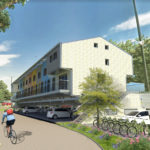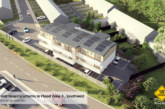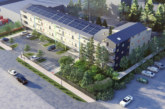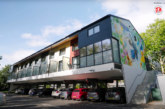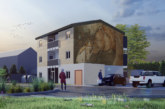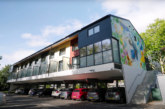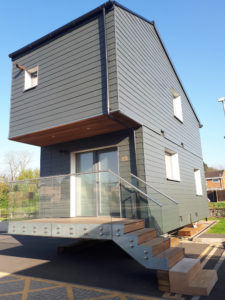 Could modular buildings be the answer to the housing crisis? New innovative rows of one- and two-bedroom houses built above carparks could bring affordable housing to cities. Dr Rehan Khodabuccus from ZED Pods explains why modular low carbon homes, constructed offsite, have an increasing role to play in tackling the housing crisis.
Could modular buildings be the answer to the housing crisis? New innovative rows of one- and two-bedroom houses built above carparks could bring affordable housing to cities. Dr Rehan Khodabuccus from ZED Pods explains why modular low carbon homes, constructed offsite, have an increasing role to play in tackling the housing crisis.
The Government calculates that we need to build 300,000 homes a year to meet housing demand, and of these nearly half should be social, affordable homes. After years with little social housing being constructed this will be tough to achieve, however with challenges come solutions.
Chancellor Philip Hammond recently announced a new Affordable Homes scheme guaranteeing up to £3bn of borrowing to support the delivery of just 30,000 new affordable homes. But for local authorities and housing associations, a guarantee of funding is not a guarantee of affordable homes. Even if it were, 30,000 is nowhere near the 145,000 affordable homes needed every year.
Without underestimating the challenge, this is an ideal opportunity to embrace new and different ideas so local authorities and housing associations have the necessary tools for increasing quality, sustainability and quantity of their housing stock.
To meet the timescale promised to deliver all these homes, Homes England and National Government have looked at construction times on a typical build and instead come out in support of modular homes, built offsite in a fraction of the time of traditional homes, as one of the key routes forward.
Offsite, however, does not necessarily mean sacrificing quality, in fact many professionals consider the opposite to be true. Factory controlled elements in the manufacturing process ensure better quality control and assurance resulting in higher levels of build quality than traditional construction on site. This creates less waste and makes higher environmental performance much more commonplace. If fully embraced within the longer-term strategy, the offsite industry can start to gear up to meet the challenge.
Holistic thinking
Modular and volumetric housing, those built in a factory and transported as completed modules is not the panacea for the entire problem, but this innovation can make a serious dent in the supply issue. If we use a new type of holistic thinking that leverages the benefits of offsite and volumetric building, we can build quicker, to a higher environmental and quality benchmark, in places where traditional builds do not work.
Take finding new land in city centres as an example. We cannot make new land, but we can use the existing land allocation differently. ZED Pods’ USP is that we build both permanent and relocatable homes using air rights above existing carparks and hard-standings without competing with the existing land use. By building rows of homes above carparks, it is possible to increase the stock outside the development plan and where people on lower incomes need to be closer to work. Creating these windfall sites for new modular homes in city centres, if done correctly, will not compete with existing land uses but instead can complement them.
It’s important to be clear about the cost and speed benefits that you will likely achieve with modular compared to conventional building solutions. Modular solutions should still be building regulation compliant and have a 10-year new-build warranty. Longevity should be similar to a conventionally built home and houses should be fully space standards compliant and mortgageable.
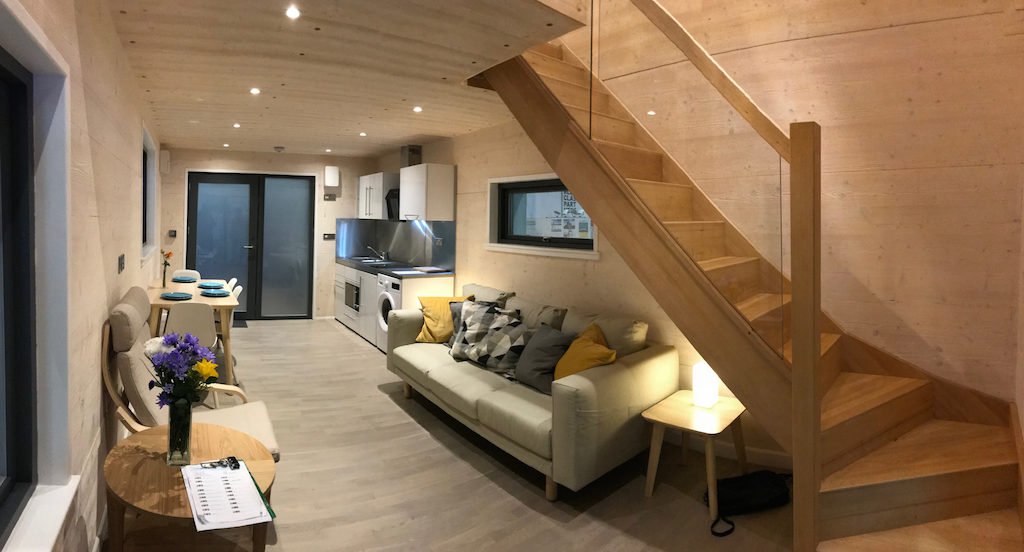
Bristol Council opportunity
One example that ZED Pods is involved with, and which is currently in the planning process, is for a city centre scheme comprising a semi-permanent development, built using the ‘air rights’ above a car park leased from Bristol Council for 30 years. This environmental and socially focused development is intended to deliver much needed housing in the area for young professionals and those at risk of housing crisis. The scheme is being offered to potential residents without parking to protect the parking spaces for the recreational park users and shoppers.
To ensure the lowest possible running costs, the homes have been optimised for energy efficiency; solar panels generate renewable electricity, quiet running heat pumps deliver low energy heating, while controlled ventilation recovers usable heat from inside the building whilst bringing in fresh air. Triple glazing, LED lighting and energy-efficient appliances ensure the lowest running costs and additionally the design ensures the homes are already ready for the ban on gas boilers due in 2025.
Each ZED Pod uses Cross Laminated Timber construction making them low embodied carbon and highly durable. The internal finish to the one and two bedroom houses is designed to be easy to clean, have exceptional longevity and be unlikely to suffer impact damage. The cladding is non-combustible, cementitious with baked on paint finish, and a large colour range is possible.
As some Pods are raised above the existing parking deck, (others sit on the ground) the under croft of the pods have been designed without any enclosed spaces and full lines of visibility from all angles. This will discourage anti-social behaviour. The scheme will offer something truly innovative, a first for Bristol and of its kind in the UK.
With significant cost advantages and new levels of flexibility for local authorities and housing associations, fast build modular housing solutions are gaining ground. Combine this with innovative rethinking about existing land use in central town and city locations, and there is real potential to deliver rapid solutions for those in housing crisis, at the same time providing beautiful, low carbon homes.
Dr Rehan Khodabuccus is Operations Director at ZED Pods

